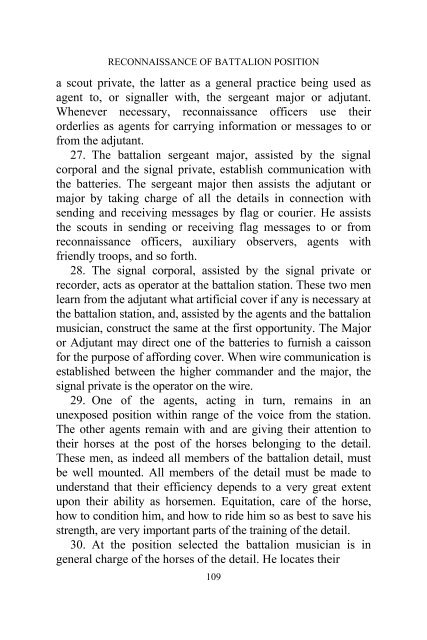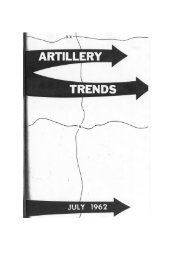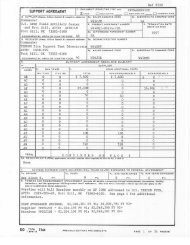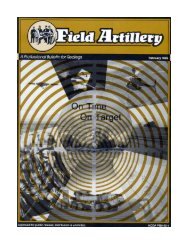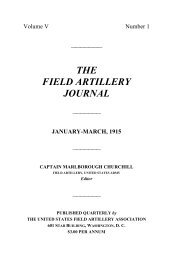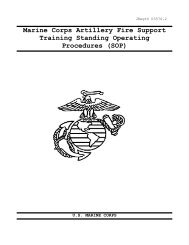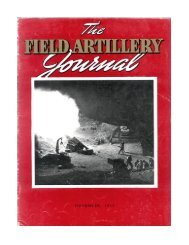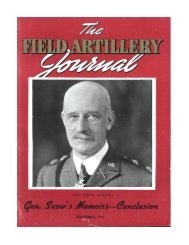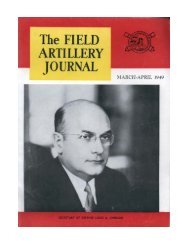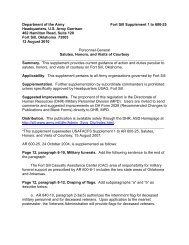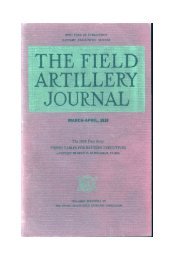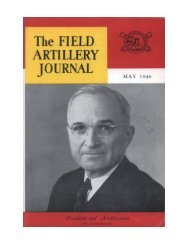the field artillery journal - Fort Sill - U.S. Army
the field artillery journal - Fort Sill - U.S. Army
the field artillery journal - Fort Sill - U.S. Army
Create successful ePaper yourself
Turn your PDF publications into a flip-book with our unique Google optimized e-Paper software.
RECONNAISSANCE OF BATTALION POSITION<br />
a scout private, <strong>the</strong> latter as a general practice being used as<br />
agent to, or signaller with, <strong>the</strong> sergeant major or adjutant.<br />
Whenever necessary, reconnaissance officers use <strong>the</strong>ir<br />
orderlies as agents for carrying information or messages to or<br />
from <strong>the</strong> adjutant.<br />
27. The battalion sergeant major, assisted by <strong>the</strong> signal<br />
corporal and <strong>the</strong> signal private, establish communication with<br />
<strong>the</strong> batteries. The sergeant major <strong>the</strong>n assists <strong>the</strong> adjutant or<br />
major by taking charge of all <strong>the</strong> details in connection with<br />
sending and receiving messages by flag or courier. He assists<br />
<strong>the</strong> scouts in sending or receiving flag messages to or from<br />
reconnaissance officers, auxiliary observers, agents with<br />
friendly troops, and so forth.<br />
28. The signal corporal, assisted by <strong>the</strong> signal private or<br />
recorder, acts as operator at <strong>the</strong> battalion station. These two men<br />
learn from <strong>the</strong> adjutant what artificial cover if any is necessary at<br />
<strong>the</strong> battalion station, and, assisted by <strong>the</strong> agents and <strong>the</strong> battalion<br />
musician, construct <strong>the</strong> same at <strong>the</strong> first opportunity. The Major<br />
or Adjutant may direct one of <strong>the</strong> batteries to furnish a caisson<br />
for <strong>the</strong> purpose of affording cover. When wire communication is<br />
established between <strong>the</strong> higher commander and <strong>the</strong> major, <strong>the</strong><br />
signal private is <strong>the</strong> operator on <strong>the</strong> wire.<br />
29. One of <strong>the</strong> agents, acting in turn, remains in an<br />
unexposed position within range of <strong>the</strong> voice from <strong>the</strong> station.<br />
The o<strong>the</strong>r agents remain with and are giving <strong>the</strong>ir attention to<br />
<strong>the</strong>ir horses at <strong>the</strong> post of <strong>the</strong> horses belonging to <strong>the</strong> detail.<br />
These men, as indeed all members of <strong>the</strong> battalion detail, must<br />
be well mounted. All members of <strong>the</strong> detail must be made to<br />
understand that <strong>the</strong>ir efficiency depends to a very great extent<br />
upon <strong>the</strong>ir ability as horsemen. Equitation, care of <strong>the</strong> horse,<br />
how to condition him, and how to ride him so as best to save his<br />
strength, are very important parts of <strong>the</strong> training of <strong>the</strong> detail.<br />
30. At <strong>the</strong> position selected <strong>the</strong> battalion musician is in<br />
general charge of <strong>the</strong> horses of <strong>the</strong> detail. He locates <strong>the</strong>ir<br />
109


